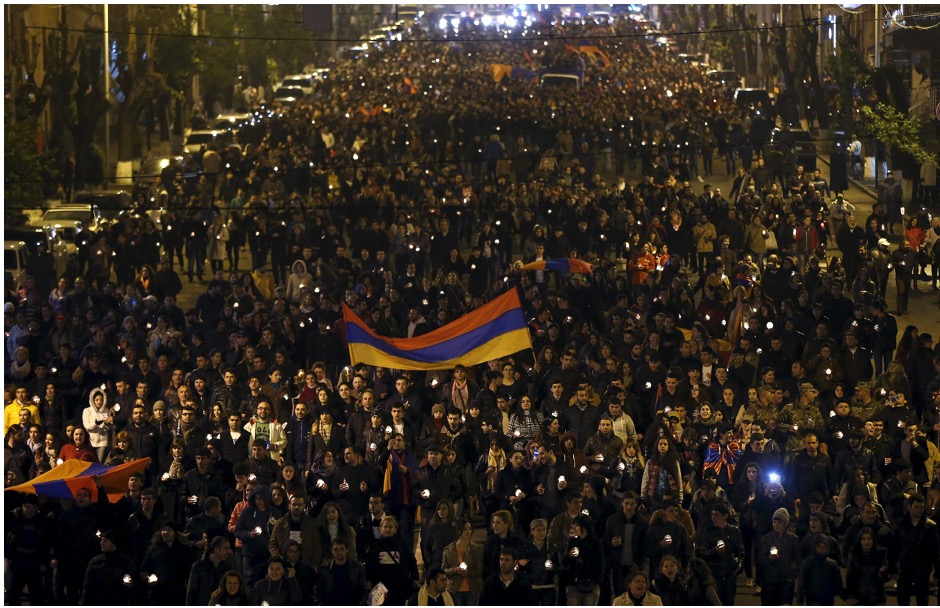Comments
HOLOCAUST STUDIES - Over the last forty-Eight years, the Holocaust has become a distinct aspect of Western culture and a universal lesson for protection of minorities and human rights. By contrast, the Armenian genocide is still being denied by Turkey and a culture of commemoration which is lagging far behind. Beyond the reason for differences between memory practices, I argue that a stronger culture of commemoration of the Armenian genocide would have twofold benefits.
The Twentieth Century has paradoxically been both the time of the greatest human tragedies -- the Holocaust and other genocides, ethnic cleansings, and mass killings -- as well as the century in which the discourse and legal institutionalization of human rights developed.
We live in dark times. At American universities, the principle of “freedom of thought” is under serious attack. Money and power have unleashed a new wave of McCarthyism — marked by political suppression and a culture of intimidation that silences critical voices and fosters repression across campuses. Columbia and Harvard stand out as the most visible examples. At Columbia, students who criticize Israel are being expelled; those without US citizenship face the threat of deportation. At Harvard, the director and associate director of the Center for Middle Eastern Studies were removed from their positions.
April reminds us — in both Turkey and Armenia — of the Armenian Genocide, which we now commemorate on its 110th anniversary. It is a time when our moral compass exerts a stronger influence over our actions. And this year, it resonates even more deeply, as the “dark times” we are witnessing extend far beyond the erosion of academic freedom. We are also witnessing a collapse of moral integrity within a field that was born out of catastrophe itself: Holocaust and Genocide Studies.

Holocaust and Genocide Studies is in deep crisis — a profound moral and intellectual collapse. At its core, this is a crisis of Holocaust Studies, triggered by Israel’s actions in Gaza. It stems from the inability — or unwillingness — of a significant portion of Holocaust scholars and institutions to take a stand. Some have even gone so far as to explicitly or implicitly support these actions. A field built on the moral imperative of “Never Again,” dedicated to preventing mass atrocities and shaping a world order grounded in ethical norms, played a defining role in the creation of international human rights law and the post-1945 global order. And yet, today, much of the field — its scholars and institutions — has abandoned its moral stance to justify state violence, effectively becoming a defender of a nation-state’s crimes. Rather than keeping a critical distance from political power, it has embraced its logic.
One especially revealing parallel lies in the legal suppression of speech. In Germany and the United States, accusations of antisemitism are increasingly used to delegitimize criticism of Israeli policies or to dismiss any reference to the term genocide in relation to Gaza. While this dynamic has not yet been fully codified into law, efforts to push such critiques beyond the bounds of acceptable public discourse are already visible.
Israel’s genocide in Gaza, while shaped by its own historical context, is in its logic a textbook example of the nation-state’s security paranoia, where defense merges with domination — and the destruction of the other. The belief that lasting peace can be achieved only through the permanent elimination of perceived threats is not new. It is simply one iteration in a long historical pattern.
What makes this moment historically significant is not Israel’s actions alone, but the response — or lack thereof — within the field of Holocaust and Genocide Studies. Because the field has been shaped in part by its symbolic and institutional proximity to Israel, the events in Gaza have provoked a profound internal crisis. Scholars who once spoke with clarity about other cases now appear hesitant — unable or unwilling to apply the same moral framework when atrocity emerges from within what they perceive as their own ethical community. Prioritizing national allegiance over universal principle, many have slipped — perhaps unwittingly — into what can only be called the banality of denialism.
(Mihran Kalaydjian has over twenty years of public affairs, government relations, legislative affairs, public policy, community relations and strategic communications experience. He is a leading member of the community and a devoted civic engagement activist for education spearheading numerous academic initiatives in local political forums.)







